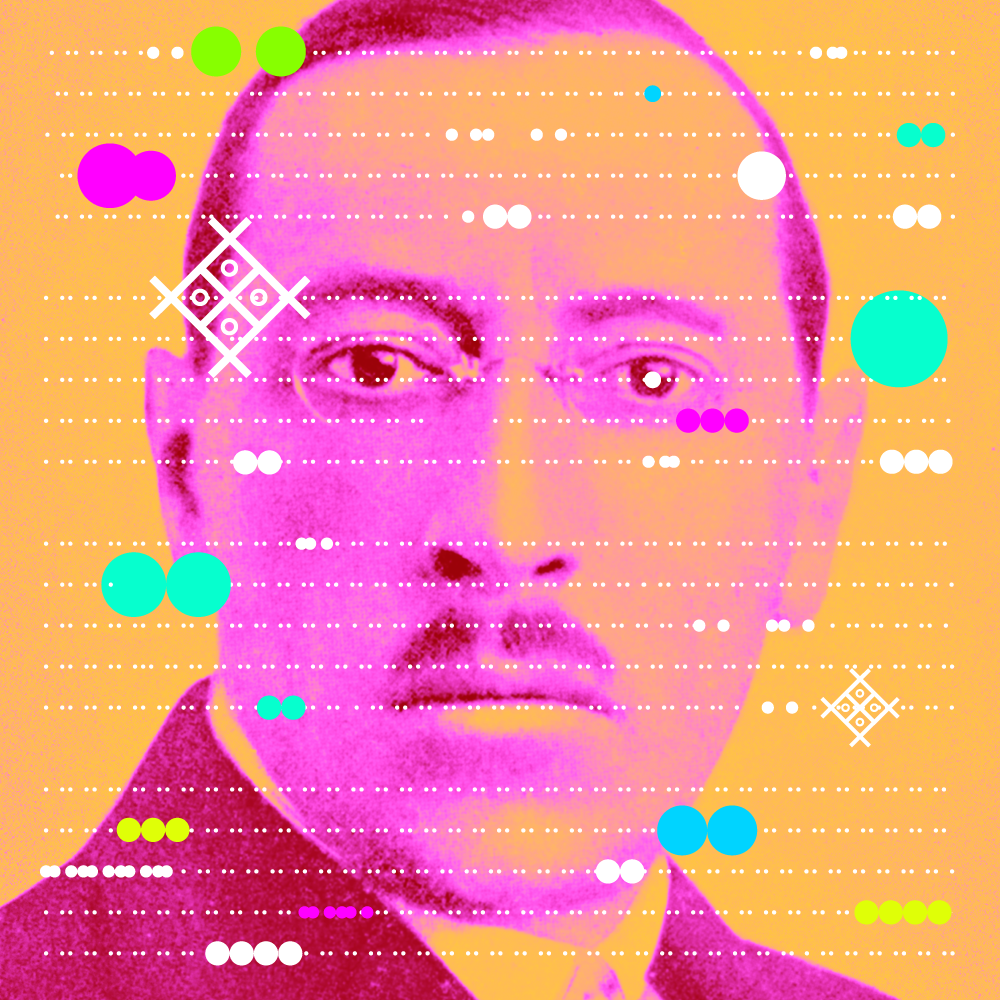STRAVINSKY’S OEDIPUS REX: A rivetting myth, ablaze with light and energy
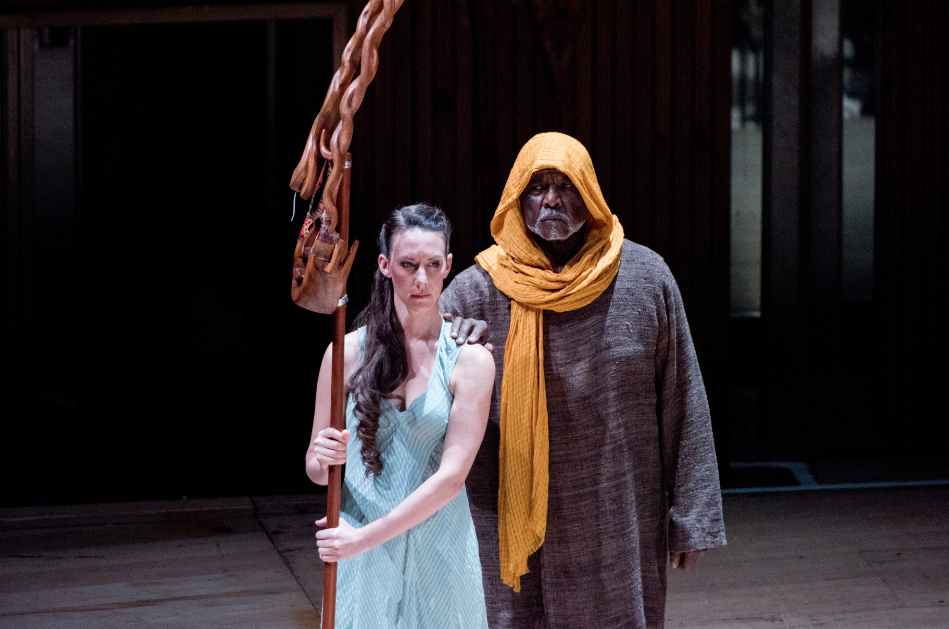
Once a year, perhaps twice a year, one might get to a concert in London that goes down as a life-long memory of something extraordinary. The performance on the 29th September, 2016 at London’s Royal Festival Hall by the Philharmonia Orchestra of Stravinsky’s Oedipus Rex had precisely that stamp of greatness from the opening moments that the narrator began to describe the action about to follow. Leaving the concert hall with a searingly intense afterimage burnt into one’s inner ear was thanks in no small part to the winning creative partnership of conductor Esa-Pekka Salonen, the director Peter Sellars and the brilliant Philharmonia Orchestra.
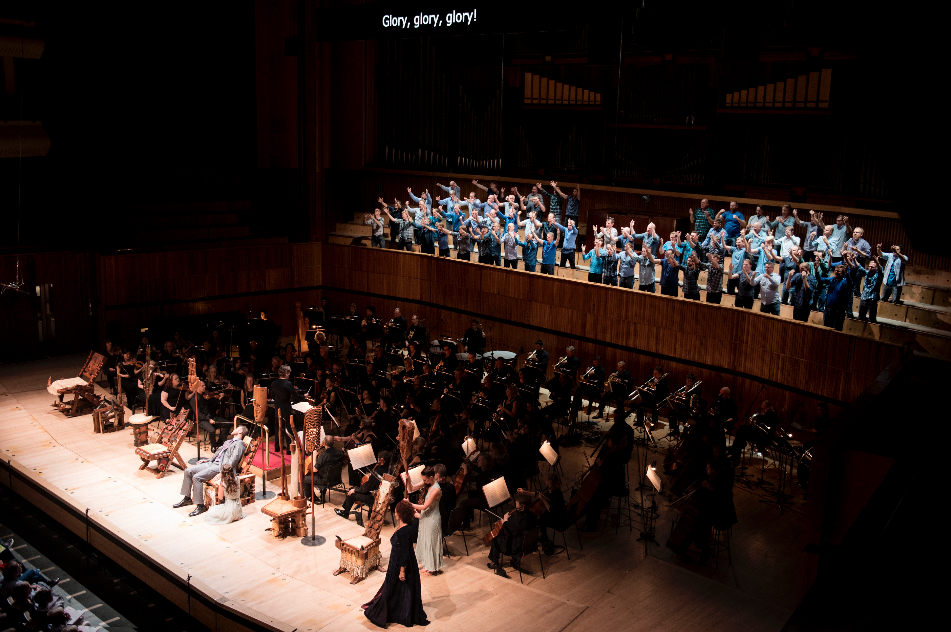
It would be no exaggeration to say that Oedipus Rex, Stravinsky’s part-opera and part-oratorio, is a sheer masterwork. Composed in 1926-27 in piano score first and then orchestrated in less than two months, the 53-minute score was finally completed just 20 days before its premiere on 30th May 1927 at the Théâtre Sarah-Bernhardt in Paris. It stands about mid-point in Stravinsky’s long and variegated career as a composer, and is an important centerpiece of his neo-classical style, an era that also gave us the brilliant The Rake’s Progress, a full length opera, composed between 1948 and 1951. In the previous decade, Stravinsky had given us the three fabulous ballet scores Firebird, Petrouchka and The Rite of Spring that still tower over twentieth century orchestral repertoire. In comparison, Oedipus Rex has taken a lot longer to establish its reputation as a work of supreme dramatic intensity and is no less brilliant in conception and sound-world.
When the creative urge arose in Stravinsky to create a new dramatic work, he turned to Sophocles, whose works he had read in Russian translation as a teenager. He chose the story of Oedipus, partly because it was a well-known myth, which gave him the opportunity to dramatise it in an esoteric language, to sculpt something infused with a monumental and epic quality, ageless, far removed from everyday reality or anything representational. He wrote of the genesis of his work in his Dialogues: “I wished to leave the play, as a play, behind. I thought to distil the dramatic essence by this, and to free myself for a greater degree of focus on a purely musical dramatization.” The acclaimed writer Jean Cocteau, a friend of Stravinsky, was entrusted with the creation of the libretto, a rather arduous process with Cocteau having to do much rewriting before Stravinsky was satisfied with the result in French. The work, thus conceived, was then translated into Latin by Abbé Jean Daniélou in which language Stravinsky finally set the text. Says Stravinsky, “the idea was that a text for music might be endowed with a certain monumental character by translation backwards, so to speak, from secular to a sacred language.”
If distillation of the play’s dramatic essence was the primordial quality the composer was after, then there was the further problem of how such a work could be staged, lacking as it did, the trappings of a conventional opera. Stravinsky had his own strong notions about this, involving masks and lighting, as well as the artifice of a narrator who comments on the action before it happens, and mediates between the work and its contemporary audience. American director Peter Sellars stayed close to Stravinsky’s original conception of a semi-dramatic performance, and this unfolded on Royal Festival Hall’s sprawling stage with the orchestra in full view, and the soloists in a single row in front, on a minimal set. The all-male chorus, attired in a rich profusion of blue hues, occupied the choir stalls behind the orchestra, but one level up and clearly visible. The interaction of the three layers was mesmeric, with poignant spoken narration weaving in and out of incredible bursts of orchestral and choral sonority that seemed to hark back to a mythic time and place.
The entire casting was wonderfully judged, with the title role memorably sung by tenor Joseph Kaiser, who focused the part with a quality of nobility, emphasized by spare gesture and an arresting stillness, an equanimity almost Asiatic in gait. But all of the singers were exceptional, and carried the same stature of declamatory reach through Stravinsky’s carefully paced drama. Emotion and poignancy seemed to stir from some rich mythic source deep within the collective unconscious of Greek tragedy itself as the chorus intoned its immense lines. One of the stars of the performance was the Orphei Drängar, the all-male Swedish choir known internationally as OD, who coloured the ritualized Latin texts with choreographed hand gestures to bring the epic to life. Essa-Pekka Salonen guided the work through its journey with a seasoned authority, achieving a superb balance between the soloists, chorus and orchestra. The story of Oedipus may be a dark tragedy, but Salonen’s climaxes were ablaze with light and energy, as befits such a masterpiece.
Oedipus Rex’s performance history had a shaky start, as the first performance in 1927 was given as a concert, and included the richly scored and spectacular Firebird in the same programme. This unfortunate programming robbed the neo-classical work of much of its dramatic power, and inevitably it suffered from the colourful ballet score by comparison. Oedipus has an austerity of temperament, but not a paucity of musical invention. What it loses in conventional dramatic idiom, it gains in ritual power. Ritual was much in evidence on Thursday night, as Peter Sellars chose to pair Oedipus Rex with Stravinsky’s Symphony of Psalms, a work of such sublime persuasion that it must rank with the greatest masterpieces of choral-symphonic literature. Following on from Oedipus, as it did after the intermission, it seemed to cast an ethereal healing light on the tragedy of Oedipus himself, as he lay blinded, mute, fallen, on the stage. Uplifting, tranquil, cathartic.
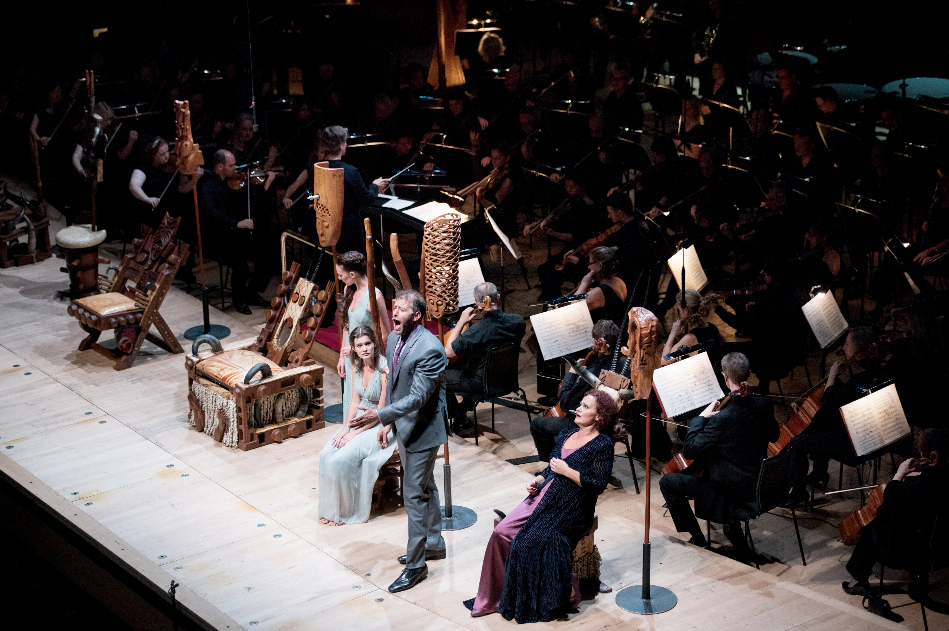
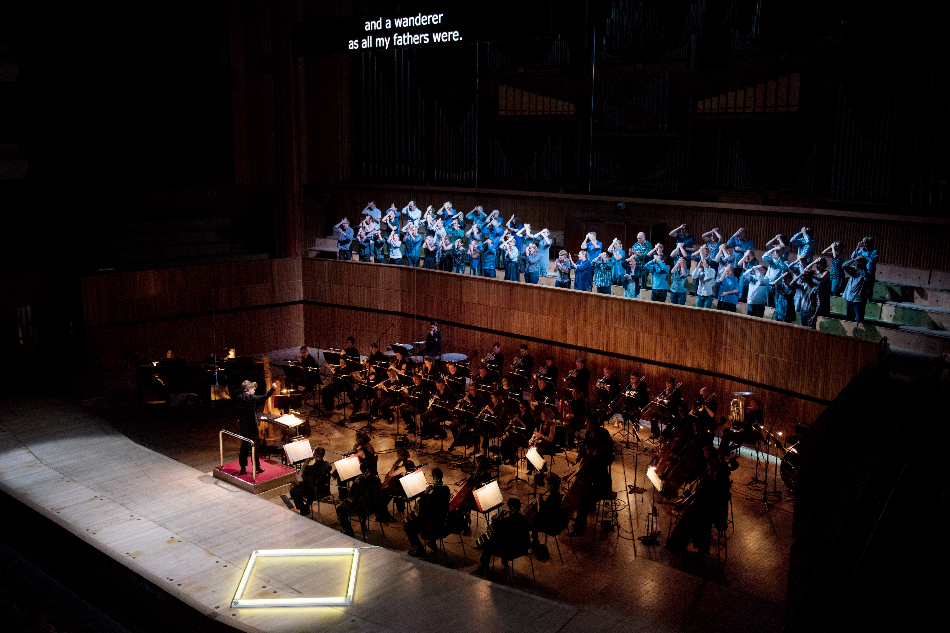
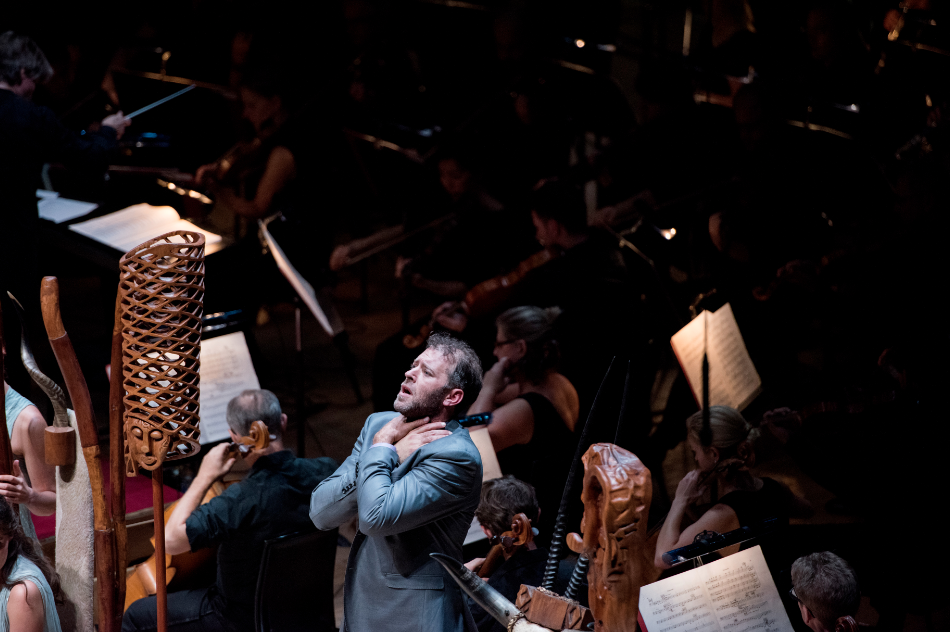
Stravinsky – OEDIPUS REX
Synopsis by Samuel Milea
Act One
The action begins with the entry of the Narrator who addresses the audience in the vernacular language of the audience (in this case English), and sets the scene for what is to follow. The citizens of Thebes are suffering from a terrible plague, leaving the whole city in a parlous state. The men of the city lament, begging the king of Thebes and conqueror of The Sphinx, Oedipus, to save the city from utter ruin. The brother-in-law of Oedipus, Creon, returns from visiting the oracle at Delphi, proclaiming the message of the gods. They have deemed that the murderer of Laius, the previous king, resides somewhere in the city and that it is his offence that has induced the plague. Oedipus takes it upon his shoulders to rid the city of the murderer. He first interrogates the soothsayer, Tiresias who, for good reason, chooses not to speak. Tiresias, in his silence, is then accused by Oedipus of committing the murder. The accusation results in Tiresias revealing information that the murder of the king was ‘by a king’. Terrified and finding it hard to believe, Oedipus accuses Tiresias of conspiring with Creon, whom Oedipus thinks desires the throne. It is at this moment that Jocasta, the wife of Oedipus, appears.
Act Two
Jocasta shames the men for arguing in a time of turmoil and suggests that the oracles are lying. Oracles frequently lie. It had been predicted that Laius would die at the hands of his own son, however he had already been murdered by robbers where the three roads met. This horrifies Oedipus further, recalling that on the road from Corinth, he once killed a man where the same three roads met. Oedipus decides it is best to leave Thebes.
A messenger appears, informing Oedipus of the death of king Polybus, whom he believed to be his father. It soon transpires that Polybus never was the father of Oedipus. An ancient shepherd appears, claiming to have found the child Oedipus in the mountains. Realising the terrifying truth, Jocasta flees. Oedipus assumes she has fled out of shame, upon her realisation that she is married to a murderer. Finally, the truth comes out as, stated by the shepherd: Oedipus is the child of Laius and Jocasta, the killer of his father and husband to his own mother. Oedipus, distraught, leaves. Word is heard that Jocasta has been found to have hanged herself in her chambers. Oedipus enters her room and, horrified to learn that he not only killed his father, the king, but also committed incest, proceeds to gouge out his eyes with her hairpin. Blinded, he then leaves the city, never again to return. The work closes with the Chorus lamenting the loss of their beloved king.
